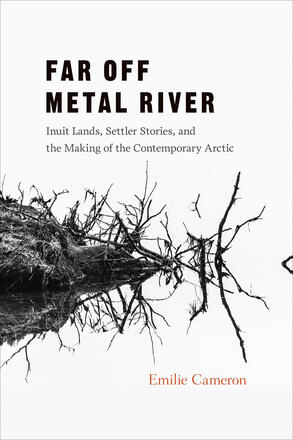
Far Off Metal River
Inuit Lands, Settler Stories, and the Making of the Contemporary Arctic
Emilie Cameron deftly connects non-Indigenous stories about the Arctic to the ongoing exploitation of the North.
Description
Drawing on Samuel Hearne’s gruesome account of an alleged massacre at Bloody Falls in 1771, Emilie Cameron reveals how Qablunaat (non-Inuit, non-Indigenous people) have used stories about the Arctic for over two centuries as a tool to justify ongoing colonization and economic exploitation of the North. Rather than expecting Inuit to counter these narratives with their own stories about their homeland, Cameron argues that it is the responsibility of Qablunaat to develop new relationships with northerners – ones grounded in the political, cultural, economic, environmental, and social landscapes of the contemporary Arctic.
Awards
- Winner, Clio-North Prize, Canadian Historical Association 2016
- Short-listed, Aboriginal History Committee Book Prize, Canadian Historical Association 2016
- Short-listed, Canada Prize in the Humanities and Social Science, Federation for the Humanities and Social Sciences 2017
Reviews
Cameron's Far Off Metal River is a masterful and carefully written book that addresses pressing theoretical and methodological questions for postcolonial studies, nature-society relations, and Indigenous geographies ... It is a timely example of a non-Indigenous researcher centering the agency of Indigenous peoples in both research practice and writing ... [This book] is a particularly important resource for students who are learning to engage with Indigenous epistemologies, ontologies, and methodologies in both the field and in the classroom ... But it would be a mistake to read Far Off Metal River as valuable to researchers of Indigenous communities and histories alone … it has much to teach us about research in general.
- Kelsey Johnson, Department of Geography, University of British Columbia
Stories—‘theirs’ and ‘ours’—have been staples in core curricula that incorporate the critical study of cultures deemed ‘Non-Western.’ Anyone tasked with teaching such courses must read this book by Cameron, who emphasizes that stories are value-charged and multidimensional … Highly recommended.
- J.S. Krysiek